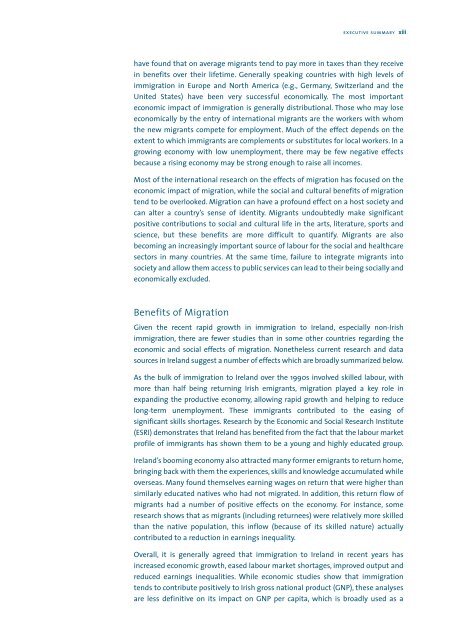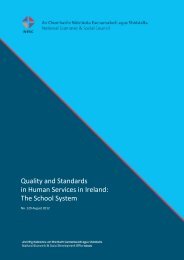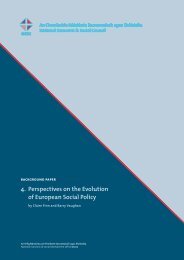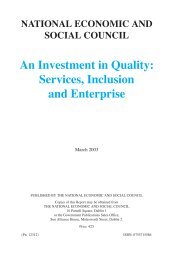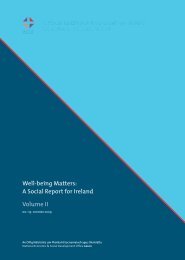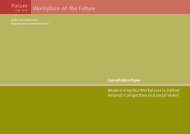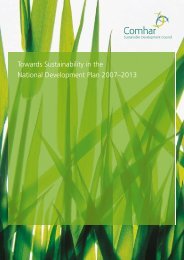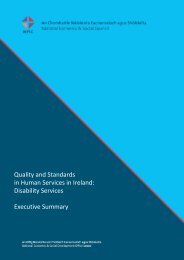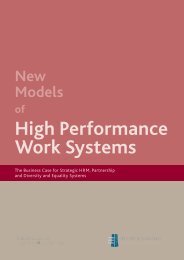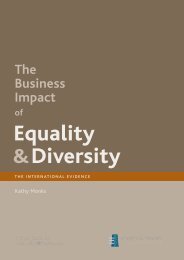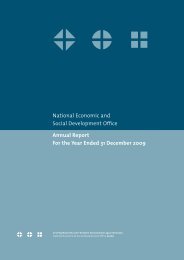Managing Migration in Ireland - European Commission - Europa
Managing Migration in Ireland - European Commission - Europa
Managing Migration in Ireland - European Commission - Europa
Create successful ePaper yourself
Turn your PDF publications into a flip-book with our unique Google optimized e-Paper software.
executive summary xiiihave found that on average migrants tend to pay more <strong>in</strong> taxes than they receive<strong>in</strong> benefits over their lifetime. Generally speak<strong>in</strong>g countries with high levels ofimmigration <strong>in</strong> Europe and North America (e.g., Germany, Switzerland and theUnited States) have been very successful economically. The most importanteconomic impact of immigration is generally distributional. Those who may loseeconomically by the entry of <strong>in</strong>ternational migrants are the workers with whomthe new migrants compete for employment. Much of the effect depends on theextent to which immigrants are complements or substitutes for local workers. In agrow<strong>in</strong>g economy with low unemployment, there may be few negative effectsbecause a ris<strong>in</strong>g economy may be strong enough to raise all <strong>in</strong>comes.Most of the <strong>in</strong>ternational research on the effects of migration has focused on theeconomic impact of migration, while the social and cultural benefits of migrationtend to be overlooked. <strong>Migration</strong> can have a profound effect on a host society andcan alter a country’s sense of identity. Migrants undoubtedly make significantpositive contributions to social and cultural life <strong>in</strong> the arts, literature, sports andscience, but these benefits are more difficult to quantify. Migrants are alsobecom<strong>in</strong>g an <strong>in</strong>creas<strong>in</strong>gly important source of labour for the social and healthcaresectors <strong>in</strong> many countries. At the same time, failure to <strong>in</strong>tegrate migrants <strong>in</strong>tosociety and allow them access to public services can lead to their be<strong>in</strong>g socially andeconomically excluded.Benefits of <strong>Migration</strong>Given the recent rapid growth <strong>in</strong> immigration to <strong>Ireland</strong>, especially non-Irishimmigration, there are fewer studies than <strong>in</strong> some other countries regard<strong>in</strong>g theeconomic and social effects of migration. Nonetheless current research and datasources <strong>in</strong> <strong>Ireland</strong> suggest a number of effects which are broadly summarized below.As the bulk of immigration to <strong>Ireland</strong> over the 1990s <strong>in</strong>volved skilled labour, withmore than half be<strong>in</strong>g return<strong>in</strong>g Irish emigrants, migration played a key role <strong>in</strong>expand<strong>in</strong>g the productive economy, allow<strong>in</strong>g rapid growth and help<strong>in</strong>g to reducelong-term unemployment. These immigrants contributed to the eas<strong>in</strong>g ofsignificant skills shortages. Research by the Economic and Social Research Institute(ESRI) demonstrates that <strong>Ireland</strong> has benefited from the fact that the labour marketprofile of immigrants has shown them to be a young and highly educated group.<strong>Ireland</strong>’s boom<strong>in</strong>g economy also attracted many former emigrants to return home,br<strong>in</strong>g<strong>in</strong>g back with them the experiences, skills and knowledge accumulated whileoverseas. Many found themselves earn<strong>in</strong>g wages on return that were higher thansimilarly educated natives who had not migrated. In addition, this return flow ofmigrants had a number of positive effects on the economy. For <strong>in</strong>stance, someresearch shows that as migrants (<strong>in</strong>clud<strong>in</strong>g returnees) were relatively more skilledthan the native population, this <strong>in</strong>flow (because of its skilled nature) actuallycontributed to a reduction <strong>in</strong> earn<strong>in</strong>gs <strong>in</strong>equality.Overall, it is generally agreed that immigration to <strong>Ireland</strong> <strong>in</strong> recent years has<strong>in</strong>creased economic growth, eased labour market shortages, improved output andreduced earn<strong>in</strong>gs <strong>in</strong>equalities. While economic studies show that immigrationtends to contribute positively to Irish gross national product (GNP), these analysesare less def<strong>in</strong>itive on its impact on GNP per capita, which is broadly used as a


